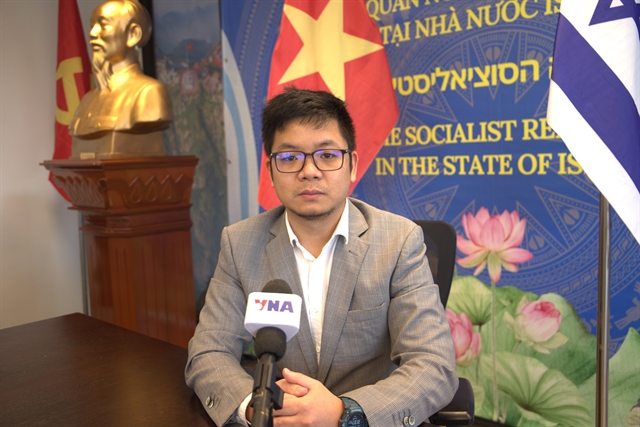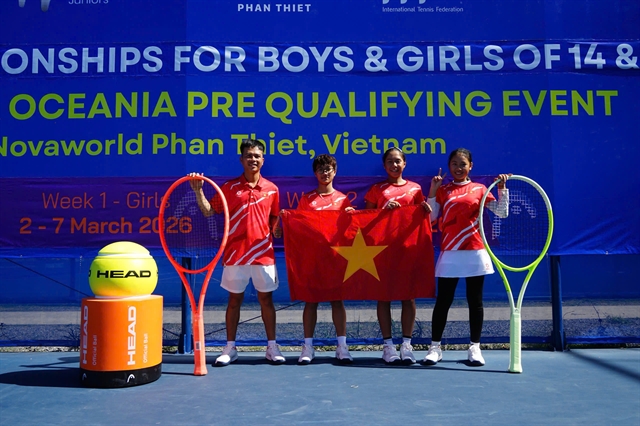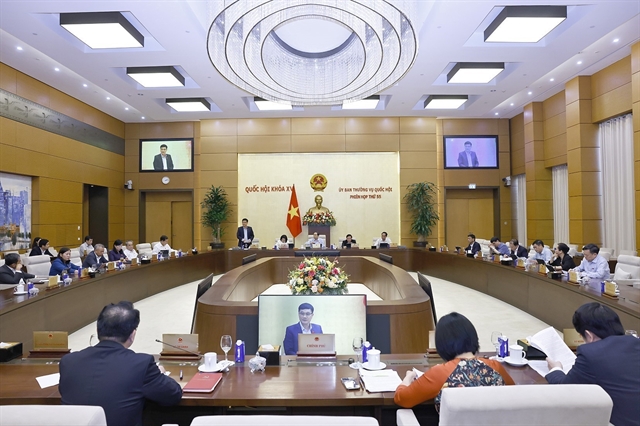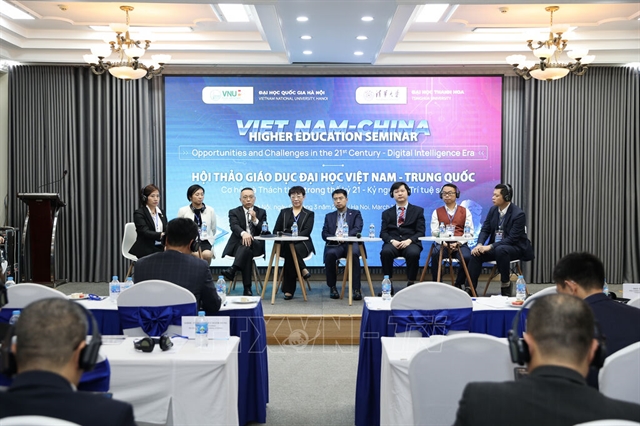 Society
Society

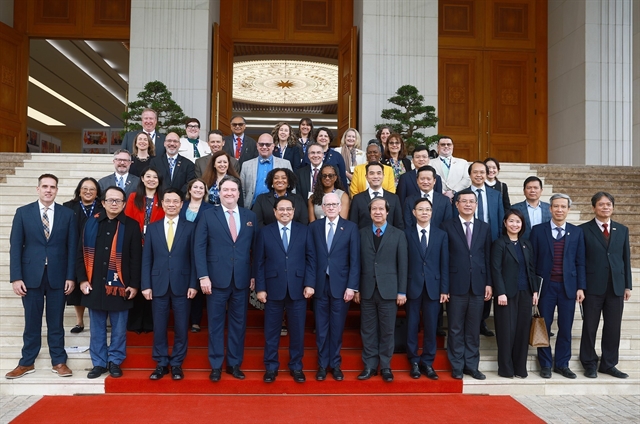 |
| Prime Minister Phạm Minh Chính and the US Ambassador to Việt Nam Marc E. Knapper, along with Vietnamese senior educational officials and representatives from US universities take a group photo on Monday. — VNA/VNS Photo |
HÀ NỘI — Vietnamese Prime Minister Phạm Minh Chính on Monday urged universities in Việt Nam and the US to enhance educational cooperation through effective long-term collaboration plans.
These efforts aim to help Việt Nam cultivate a high-quality workforce in emerging industries and effectively use marine, space and underground resources.
Chính's remarks came during a meeting with a delegation from 21 leading US universities participating in the International Academic Partnership Programme (IAPP) 2025 in Việt Nam.
The PM expressed his delight in meeting the delegation during the 30th anniversary of the Việt Nam-US diplomatic relations.
Reflecting on the history of bilateral ties, he recalled that in early 1946, shortly after Việt Nam gained independence, late President Hồ Chí Minh sent a letter to then US President Harry Truman, expressing Việt Nam's goodwill and desire to establish formal diplomatic relations with the US.
Over the decades, Việt Nam and the US have transitioned from former adversaries into comprehensive strategic partners. Both sides have emphasised setting aside past differences, seeking common ground, minimising disagreements, and respecting each other's differences, while advancing toward a better future.
After 30 years of diplomatic relations, Việt Nam and the US have achieved remarkable progress and become key partners in various fields. Cooperation across education, training, science, technology and innovation has been identified as a key pillar of their partnership, delivering significant outcomes.
Around 30,000 Vietnamese students are studying in the US, making Việt Nam the fifth-largest source of international students in the country. Additionally, about 50 joint training programmes between Vietnamese and US universities, primarily at the undergraduate and master's levels, have been established.
Citing late President Hồ Chí Minh’s famous words, 'An ignorant nation is a weak nation,' PM Chính reaffirmed Việt Nam's commitment to making education and training a top national priority. Việt Nam, he noted, has been focused on eradicating illiteracy and enhancing education since gaining independence.
Việt Nam is building its future on three main pillars: a socialist rule-of-law state, a socialist democracy and a socialist-oriented market economy. The country is pursuing three strategic breakthroughs: institutional reforms, infrastructure development, and high-quality human resource cultivation, with a strong emphasis on scientific and technological advancement, innovation and digital transformation.
To this end, Việt Nam has issued several key policies aimed at fundamentally and comprehensively reforming its education and training system, while fostering innovation and national digital transformation.
Việt Nam has pledged to allocate up to one-fifth of its total State budget to education and training, underscoring its commitment to enhancing intellectual capacity, nurturing talent and fostering holistic human development. Chính expressed hope that the US would continue to share expertise and collaborate in developing Việt Nam's education and training sector.
US Ambassador to Việt Nam Marc E. Knapper and representatives from US universities expressed high appreciation for Việt Nam's strategic development goals, particularly in education and training.
They reiterated their willingness to collaborate with Việt Nam in achieving its socio-economic development strategies, especially in education, science, technology and innovation. These efforts aim to improve the quality of Việt Nam’s workforce and deepen the Comprehensive Strategic Partnership between the two countries.
Representatives from US universities also highlighted the potential for cooperation with Việt Nam through the IAPP 2025 programme. This initiative seeks to connect Vietnamese and US universities strategically, facilitating the creation of practical and sustainable collaboration plans.
During IAPP 2025, 21 US universities and 30 Vietnamese universities will explore areas of cooperation, focusing on STEM education, digital transformation, green transition, information and communication technology (ICT), semiconductors, AI, automation and biotechnology.
While acknowledging past achievements, Chính pointed out that collaboration between Vietnamese and US universities has not yet reached its full potential.
He urged both sides to strengthen ties through innovative and flexible approaches such as student and faculty exchanges, joint training programmes and collaborative research in emerging fields. He also called on the US to expand scholarship opportunities and offer tuition incentives for Vietnamese students and researchers.
The PM encouraged universities from both countries to work closely with major US corporations, including Intel, NVIDIA and Apple, which have been exploring and investing in Việt Nam, to develop specific cooperation programmes.
These programmes would focus on high-tech industries such as AI, semiconductors, biotechnology, healthcare, agriculture, and foreign languages, ensuring the development of a highly skilled workforce aligned with the needs of businesses from both nations.
Chính noted that Việt Nam is striving for 8 per cent economic growth in 2025 as a foundation for achieving double-digit growth in the following years. To reach these goals, Việt Nam is implementing transformative strategies, including institutional reforms, administrative streamlining and a shift from passive to proactive public service delivery.
He emphasised the critical role of science, technology, innovation, and digital transformation as new growth drivers, with the private sector serving as a key engine of economic development.
Việt Nam is also making concerted efforts to balance trade with the US and sustain economic growth by reducing tariffs on US exports such as wood and agricultural products, while increasing imports of high-tech goods, including aircraft and liquefied natural gas (LNG).
US university leaders were urged to advocate for recognising Việt Nam as a market economy, easing restrictions on high-tech exports to Việt Nam and minimising policies that could negatively impact bilateral trade and economic ties.
With a philosophy of valuing 'intellect, time, and decisiveness', and a commitment to continuous improvement, the PM expressed confidence that Việt Nam-US educational cooperation would become deeper and more effective in the coming years.
He believed these efforts would contribute not only to the development of both nations, but also to the promotion of peace, cooperation and sustainable development in the region and globally. — VNS


